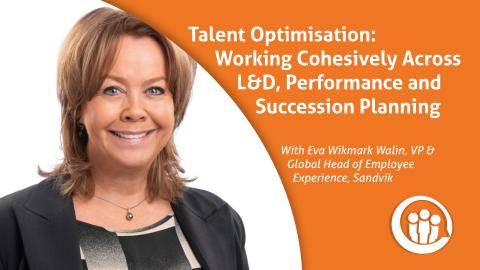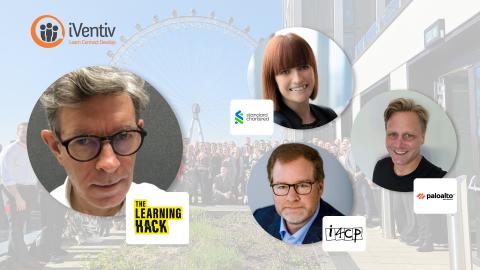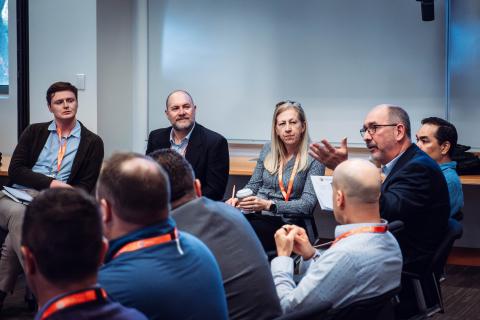Welcome to our latest blog post featuring Shaheena Janjuha-Jivraj, Associate Professor in Entrepreneurial Leadership & Diversity at HEC Paris in Qatar and a recognised icon in diversity, innovation, and entrepreneurial leadership.
With her extensive background in teaching entrepreneurship at leading UK business schools, Shaheena has cultivated a deep passion for fostering women in leadership. Through her work, Shaheena emphasises that true innovation requires not only diverse teams but also a leadership model that embraces psychological safety, an entrepreneurial mindset, and continuous learning.
Join us as we delve into the insights and strategies from Shaheena's ground-breaking book, Take the Lead: How Women Leaders are Driving Success Through Innovation, and explore her invaluable advice for aspiring female leaders navigating today's complex business landscape.
What Ignited Shaheena’s Passion Around Women in Leadership?
This passion, Shaheena tells us, was ignited by her extensive experience teaching entrepreneurship at UK universities and business schools, such as Brunel Business School and Henley Business School. Through her teaching, she recognised the importance of “diverse thinking” in fostering entrepreneurial mindsets and generating innovative ideas.
She observed that, by incorporating students from various faculties, not just business schools, “that's when you really saw a different level of thinking and different quality of ideas.”
As her focus on diversity expanded, she realised that achieving true innovation required not only diverse teams but also strong leadership. This leadership needed to be different from traditional models, emphasising an entrepreneurial mindset, psychological safety, and a willingness to experiment and learn.
Over the past 15 years, she has been committed to demonstrating the business case for diversity, emphasising that shifting behaviours and adopting new leadership models can lead to significant business and personal performance benefits. This comprehensive approach, combining diversity with innovative leadership, has been central to her work and passion for advancing women in leadership.
Shaheena's Insights into her book Take the Lead: How Women in Leadership are Driving Success Through Innovation
Shaheena's book emerged from her work running women's leadership programs in male-dominated sectors in Qatar. She mentions that in the last 18 months, “we have delivered programs for 150 women in the region,” and in writing the book and designing leadership programmes, she wanted to ensure that they “super-boosted leadership for women” by integrating innovation and creativity into leadership training.
Key points surrounding this book, as highlighted by Shaheena, include:
-
Programs in Male-Dominated Sectors
Shaheena and her team designed programs for women in sectors like oil, gas, banking, and finance, emphasising that women should not be seen as needing help but rather as capable leaders.
-
Innovation at the Core
Programmes were centered the around innovation and creativity, promoting a new leadership model that values diversity and fosters an innovative mindset.
-
Seven Cs Framework
The book introduces the "Seven Cs" framework—each representing a key area of leadership (e.g., courage, connections, champions)—used to help women navigate their careers. This framework was developed through iterative testing and is visually represented as a boat navigating the seas.
-
Real-Life Stories
The book includes stories from diverse women across the globe, providing relatable role models and highlighting how different leadership strengths contribute to success.
The book integrates theoretical insights with practical applications and real-life examples, making it a comprehensive guide for women aiming to enhance their leadership capabilities and drive success through innovation.
The Importance of Role Models and Champions in the Career of the Female Leader
Shaheena's insights emphasise the importance of accessible role models, the critical role of champions in career advancement, and the effectiveness of taking on challenging roles to combat such things as Imposter Syndrome. These strategies, she says, are key to helping women navigate their careers and reach leadership positions.
In her discussion, Shaheena highlights several patterns and strategies for overcoming learned helplessness among women in leadership, based on her research and programs:
-
Role Models and Early Influences
Through her research into this topic, it was consistently found that successful women had accessible role models, such as teachers, neighbours, or parents (often fathers), who provided encouragement and belief in their potential from a young age. This early support played a critical role in their development.
-
Champions and Advocacy
While mentoring is common, it is often insufficient for career advancement. Women need champions—senior leaders who advocate for them in critical settings, offering visibility and opportunities that mentoring alone cannot provide. Despite awareness, only about “15% of women reported having champions.”
-
Job Crafting and Custom Roles
Senior women often reach a point where they can craft their own roles within organisations, leveraging their extensive experience and skills. Organisations that recognise the value of retaining such talent are willing to create bespoke roles to fit these women's unique contributions.
-
Addressing Imposter Syndrome
Imposter Syndrome is seen as a form of learned helplessness. The antidote, according to Shaheena, is taking on stretch roles—challenging tasks that build self-efficacy and resilience. Champions play a vital role here, providing the necessary push and support for women to take on these roles and overcome self-doubt.
Shaheena’s Champions
Shaheena has had several champions throughout her career. One notable champion was Casey Chisholm, a senior figure in her university during Shaheena's first lecturing role. Casey provided inspiration and opportunities, pushing Shaheena to excel and eventually becoming a business partner.
Another influential figure was Professor Adrian Woods, who significantly shaped her teaching approach in entrepreneurship. Despite his passing, Shaheena recognises his persistent encouragement and forward-thinking influence. Additionally, her family, especially her parents and husband, offered unwavering support and motivation.
Shaheena emphasises that these champions were not just about career advancement but also about learning from their interactions, network building, and supportive community.
What Key Piece of Advice Would You Give to the Female Leader?
Shaheena advises female leaders to begin by reading her book, which is packed with insights and guidance specifically tailored for women aspiring to leadership roles. The collaborative process of writing the book with her colleagues, despite geographical and time zone challenges, reinforced the importance of not letting fear hold you back. She encourages women to build strong support networks, and illustrates that collaboration and mutual support are crucial for success.
In today's world, where women's leadership is under a significant spotlight, mixed messages about what it means to be a female leader can be challenging. Therefore, she says, it's vital to find and support yourself with a tribe of both women and men who champion your efforts.
She further underscores the importance of enjoying the journey. Despite the sobering reality presented by research from the World Economic Forum, which indicates it could take “130 years to reach gender parity”, it’s essential to find joy and satisfaction in your work. This long timeline, Shaheena states, reflects setbacks exacerbated by the COVID-19 pandemic, making it clear that achieving gender parity is a generational effort. Nevertheless, the ongoing progress in various programs and initiatives should not be overlooked.
Shaheena goes on to highlight that passion alone is not enough; actions must be grounded in credible data and research to effect real change. Progress is also not linear, and setbacks are inevitable, but "opting out is not an option." It's crucial, she tells us, to keep pushing forward, ensuring that efforts are impactful and based on solid evidence. At the same time, maintaining a sense of enjoyment and having supportive people around you is vital for sustaining long-term efforts and avoiding burnout.
Pushing Towards Progress
According to Shaheena, to ensure continuous progress, people should:
- Ensure their work is credible and strong; attending programs alone isn’t enough for advancement
- Utilise and build networks, acting as connectors and lifting others to build platforms of support rather than individual pedestals
- Invest in themselves by advocating for participation in leadership programs and demonstrating their value
- Develop deep, meaningful connections rather than superficial ones, and actively ask for support and resources from their networks (men, she says, are more likely to do this than women)
- Challenge assumptions, such as the notion that women shouldn’t use their networks transactionally; instead, leverage relationships for tangible benefits
- Focus on fostering collaboration and psychological safety to enhance connectivity and progress.
Shaheena's experience with iVentiv exemplifies the power of meaningful connections. The natural flow of conversations and the development of subject matter expertise in comfortable settings, she says, leads to long-lasting and valuable relationships. This collaborative approach and the creation of psychological safety and cohesiveness are key to fostering a supportive environment that drives progress.
Frequently Asked Questions
What inspired Shaheena’s passion for women in leadership?
Shaheena's passion for women in leadership was sparked by her extensive experience teaching entrepreneurship at UK universities and business schools. Through her teaching, she realised the importance of diverse thinking in fostering entrepreneurial mindsets and generating innovative ideas, which led her to focus on the need for diverse teams and innovative leadership.
What is the main focus of Shaheena's book "Take the Lead: How Women in Leadership are Driving Success Through Innovation"?
Shaheena's book focuses on integrating innovation and creativity into leadership training for women, particularly in male-dominated sectors. It introduces the "Seven Cs" framework, which represents key areas of leadership, and includes real-life stories from diverse women around the globe, providing a comprehensive guide for women aiming to enhance their leadership capabilities.
How does Shaheena view the role of role models and champions in women's leadership?
Shaheena emphasises the importance of accessible role models and champions for women's career advancement. Role models provide early encouragement and belief in potential, while champions offer visibility and opportunities in critical settings. She notes that mentoring alone is often insufficient and highlights the need for senior leaders who actively advocate for women.
What key advice does Shaheena give to female leaders?
Shaheena advises building strong support networks, collaborating with others, and enjoying the journey despite the long timeline to gender parity. She underscores the importance of grounding actions in credible data and research to effect real change.
What steps does Shaheena recommend for ensuring continuous progress in women's leadership?
- Ensuring work is credible and strong
- Building and utilising networks for support
- Advocating for participation in leadership programs
- Developing deep, meaningful connections and actively asking for support
- Challenging assumptions and leveraging relationships for tangible benefits
- Fostering collaboration and psychological safety to enhance connectivity and progress
Dr Shaheena Janjuha-Jivraj is an expert in innovation, DEI, and women's leadership and a faculty member at HEC Paris in Qatar. She collaborates with public organizations, NGOs, and private business leaders worldwide, including FTSE100 and Fortune 500 companies, facilitating cultural transformation and strengthening workplace environments. Shaheena also has extensive experience working on gender leadership policy reports for renowned institutions such as the Commonwealth Secretariat, UK Council, European Union, and G20.
Shaheena will be continuing this discussion at Learning Futures Dubai (29-30 October,2024) at the Majid Al Futtaim HQ










